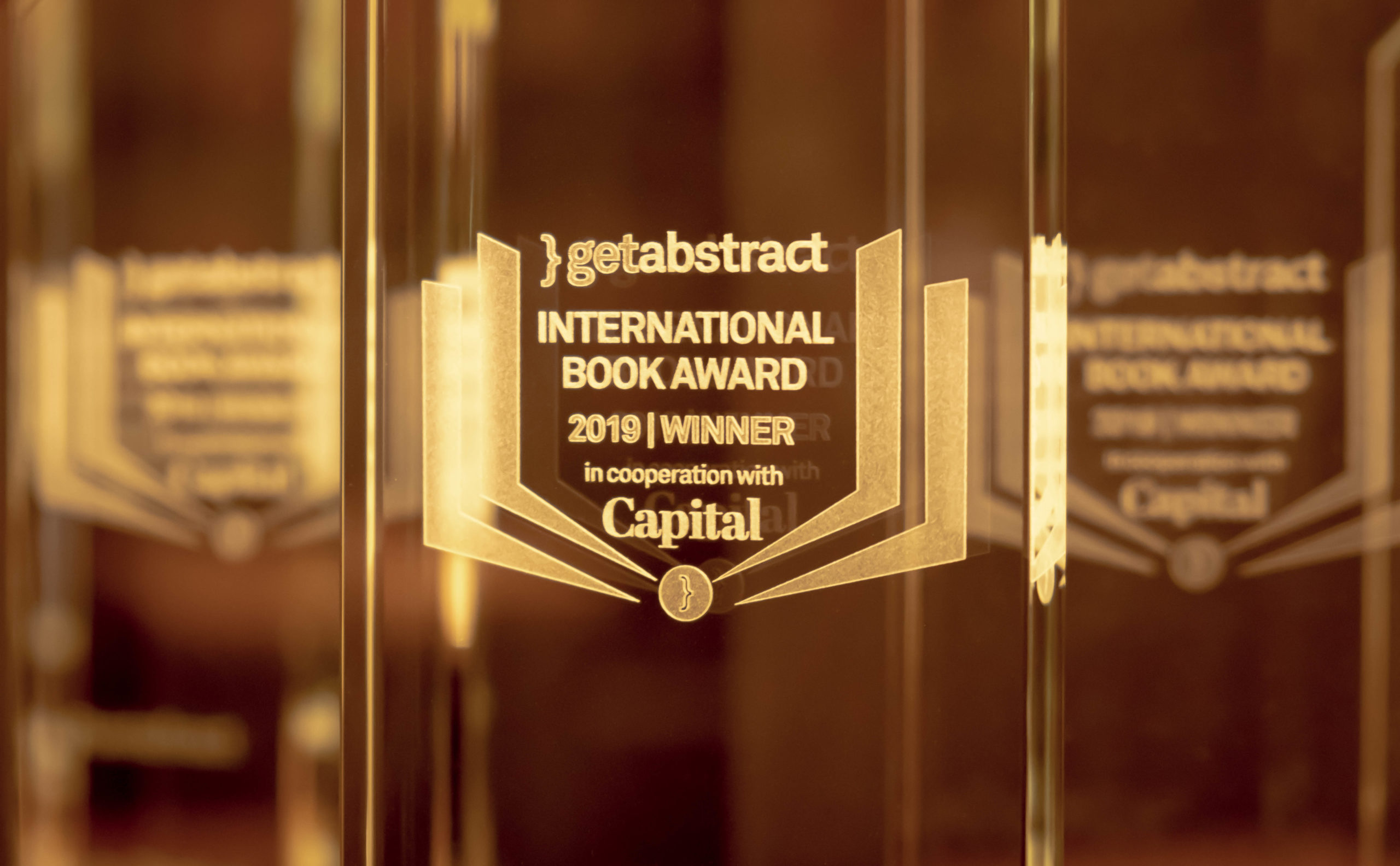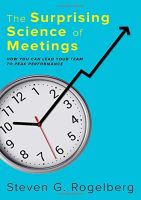Many things in our daily lives have changed since 2001, when the getAbstract International Book Award was created. The award was conceived as a way to recognize those books that make important contributions to the issues of today. Scrolling through past winners is an immediate insight into the topics that accompanied us then, and are […]
On the value of time and thought: presenting the 2019 shortlist, part 1 of 2

Many things in our daily lives have changed since 2001, when the getAbstract International Book Award was created. The award was conceived as a way to recognize those books that make important contributions to the issues of today. Scrolling through past winners is an immediate insight into the topics that accompanied us then, and are still present now.
In fact, some colleagues in the getAbstract office weren’t even born when the first trophies were awarded at the Frankfurt Book Fair. The award is something of a venerable institution; previous shortlists are time capsules.
When putting together this summary of the first five titles from our English shortlist, it wasn’t immediately clear how to group them. But with the thought above in mind, the passing of time became a clear common theme. This selection from the shortlist deals with such an important factor in our daily lives. The faster our lives become, the more valuable the individual moments.
As we try to balance work, life, and everything in between, these books provide relevant guidance for all readers. From acting in the best interests of your future self, to better using your colleagues’ time during business meetings, to recognizing the valuable moments that arise during heated conflicts; from gradual changes over decades to changes you can make can make today: read on to discover the first five titles in the English shortlist.
[maxbutton id=”17″ url=”https://www.getabstract.com/en/channels/getabstract-international-book-award-nominees-2019/96827″ text=”BROWSE THE 2019 SHORTLISTS” ]

Your future self will be grateful you read this book. Elizabeth White is an author, aging solutions advocate, and seasoned non-profit executive. In her book she offers meaningful lessons on redefining priorities, making wiser choices and exploring new opportunities. Poignant anecdotes and life lessons don’t instill regret: this book doesn’t lament wasted time and chances. It’s a forward-looking, inspiring call to action that is relevant to people of all ages, whether retirement is already here or many years in the future.

How we take charge of our life is a choice we make every day, and what we do today will absolutely affect tomorrow – and all the days after that. Taking the time to read White’s warm, personal part-memoir, part-how-to-guide is a gift to yourself, for which you will be grateful.
“The world as we knew it has changed forever and if we want better futures, we’re going to have to change too.”
[maxbutton id=”8″ url=”https://www.getabstract.com/en/summary/55-underemployed-and-faking-normal/34494″ ]
 Martial arts might be a combat sport, but Aikidoists handle physical conflict with grace and elegance. They don’t try to repel attack energy; they harmoniously flow with it. As a third-degree black belt in Aikido, Judy Ringer explains that this martial art and its mind-body principles can guide managers in handling disputes. She carefully details her step-by-step conflict resolution system as she teaches managers how to use this elegant approach to restore workplace peace.
Martial arts might be a combat sport, but Aikidoists handle physical conflict with grace and elegance. They don’t try to repel attack energy; they harmoniously flow with it. As a third-degree black belt in Aikido, Judy Ringer explains that this martial art and its mind-body principles can guide managers in handling disputes. She carefully details her step-by-step conflict resolution system as she teaches managers how to use this elegant approach to restore workplace peace. 
Ringer applies conflict principles from Aikido to essential leadership skills such as self-management under pressure and appreciation of other viewpoints. In a time when conflict potential seems to be on the rise in all aspects of our life, this is a practical guide to redirecting negative conflict energies into a positive and harmonious outcome.
“Your first goals are to learn and fully understand the conflict stories as well as sense the possibilities for resolution.”
[maxbutton id=”8″ url=”https://www.getabstract.com/en/summary/turn-enemies-into-allies/36100″ ]
 “Bad meetings should never be accepted as an organizational norm,” and yet, haven’t we all endured seemingly endless – and pointless – meetings? In 2014, meetings cost the United States’ economy about $1.4 trillion – roughly 8% of the nation’s GDP. Steven G. Rogelberg is Chancellor’s Professor at University of North Carolina, Charlotte, for distinguished national, international, and interdisciplinary contributions.
“Bad meetings should never be accepted as an organizational norm,” and yet, haven’t we all endured seemingly endless – and pointless – meetings? In 2014, meetings cost the United States’ economy about $1.4 trillion – roughly 8% of the nation’s GDP. Steven G. Rogelberg is Chancellor’s Professor at University of North Carolina, Charlotte, for distinguished national, international, and interdisciplinary contributions.  In addition to outreach programs focusing on non-profit organization health and effectiveness, Rogelberg is a consultant with a long list of heavyweight corporate clients. This is a how-to guide to creating meetings with a purpose that people enjoy, rather than dread, and from which everyone benefits.
In addition to outreach programs focusing on non-profit organization health and effectiveness, Rogelberg is a consultant with a long list of heavyweight corporate clients. This is a how-to guide to creating meetings with a purpose that people enjoy, rather than dread, and from which everyone benefits.
“Never forget the one thing people dislike more than meetings: not being invited to a meeting.”
[maxbutton id=”8″ url=”https://www.getabstract.com/en/summary/the-surprising-science-of-meetings/36255″ ]
People tend to rush to conclusions, accept misinformation, skip nuance or trust shallow assumptions. This is a time of incessant distractions and immediate responses via myriad channels. Instead, Dan Pontefract says, pause to ponder. This is time well spent. “The length of an hour hasn’t changed, but we’re trying to jam more in those 60 minutes than we used to, and there’s a cost to that,” he says. 
Pontefract, a leadership strategist with over 25 years’ experience, practices what he preaches by scheduling weekly uninterrupted “think time”. His encouragement to think before you act is a valuable lesson in an increasingly fast-paced world, and a reminder that a carefully considered response is usually more effective than the quickest solution.
“Better thinking is hard, not easy. Better thinking takes time, not haste. There is no shortcut.”
[maxbutton id=”8″ url=”https://www.getabstract.com/en/summary/open-to-think/32924″ ]
 Despite decades of diversity initiatives, most American CEOs are still white men. Barbara B. Adams, PsyD., advises business leaders on what they can do to eliminate the underlying bias still very much present in the boardroom, the factor that drives the hiring bias. The aim is to create more diverse, inclusive and therefore more successful firms. Adams discusses concrete policies businesses might apply to increase diversity and bring more women and people who belong to minority groups into positions of power.
Despite decades of diversity initiatives, most American CEOs are still white men. Barbara B. Adams, PsyD., advises business leaders on what they can do to eliminate the underlying bias still very much present in the boardroom, the factor that drives the hiring bias. The aim is to create more diverse, inclusive and therefore more successful firms. Adams discusses concrete policies businesses might apply to increase diversity and bring more women and people who belong to minority groups into positions of power.  Adams holds a Doctorate of Psychology in Organizational Development and has over twenty years of experience in global management and in the field of Diversity & Inclusion. Her book encourages a critical perspective on diversity and inclusion by addressing the underlying cause rather than simply treating the symptoms.
Adams holds a Doctorate of Psychology in Organizational Development and has over twenty years of experience in global management and in the field of Diversity & Inclusion. Her book encourages a critical perspective on diversity and inclusion by addressing the underlying cause rather than simply treating the symptoms.
“Significant data supports the idea that diverse, inclusive teams consistently outperform homogeneous teams.”
[maxbutton id=”8″ url=”https://www.getabstract.com/en/summary/women-minorities-and-other-extraordinary-people/34198″]





